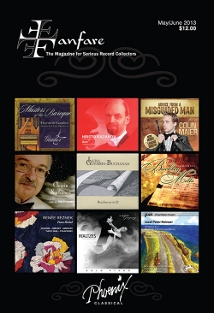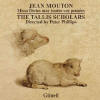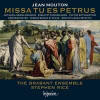Texte paru dans: / Appeared in:

Fanfare Magazine: 36:5 (05-06/2013)
Pour
s'abonner / Subscription information
Les abonnés à Fanfare Magazine ont accès aux archives du
magazine sur internet.
Subscribers to Fanfare Magazine have access to the archives of the magazine
on the net.
The number of all-Mouton discs currently available has doubled almost overnight. The only full discs of Mouton’s music that were available last year were Graham Walker’s Quilisma disc featuring Missa Dictes moy toutes voz pensées and Haig Mardirosian’s collection of recording premieres with Missa Alma redemptoris mater (Fanfare 32:2). Now we have two new collections, Peter Phillips duplicating the Mass on Walker’s disc and Rice offering the first recording of Missa Tu es Petrus. Philips and Walker both include the source of the cantus firmus of the Mass, a two-minute song by Loyset Compere, but that necessary addition shouldn’t count against crediting Mouton with a full disc.
Philips includes an interesting lament for Anne of Brittany, who died young in 1514 (Fanfare 36:1). The text is modified slightly from a medieval lament found in Codex Las Huelgas, Quis dabit capiti meo aquam, recorded at least 10 times. Mouton’s version, Quis dabit oculis nostris, has been recorded by Charles Ravier, Konrad Ruhland, and Maurice Bourbon. It has been overshadowed by a similar work for the same funeral composed by Costanzo Festa; the only recording I have is on Paul Van Nevel’s Festa program (Sony SK 53116), but at least seven others, most recently David Skinner (33:1), perform Senfl’s arrangement of the ode, altered to mark the death of Maximilian I in 1519. Earlier, Heinrich Isaac composed two similar laments on the death of Lorenzo the Magnificent in 1492. The less familiar one, Quis dabit pacem populo timenti, has been recorded at least once by the Hilliard Ensemble in the Reflexe Series. The other, Quis dabit capiti meo aquam, is found on at least seven discs in my collection ranging from Noah Greenberg to Edward Wickham (31:2).
The principal comparison to the Phillips disc is Graham Walker’s version of the Mass with the Gentlemen of St. John’s, a group of 16 men of St. John’s College Choir of Cambridge. Phillips takes tempos slightly faster than Walker until the Agnes Dei, where they come out even. Walker has 16 men compared to the eight who sing under Phillips (with one or two voices added as needed in individual movements). Since neither of these fits the notion of one voice to a part, they can be directly compared. Walker’s larger contingent, perhaps caught further from the microphone, produces a softer sound than the smaller group under Phillips, a more attractive rendition to my ears. Both versions are fine interpretations of the Mouton work. Phillips duplicates two other pieces on Walker’s program, Nesciens Mater and Salva nos Domine.
The other disc is a different story entirely. The 16 mixed voices of the Brabant Ensemble (with an extra soprano in one motet) produced the most delicate sound of the discs heard today. Nesciens mater, heard on all three discs, provides the clearest comparison. The first four motets are set for eight voices; Rice uses a smaller number of singers for the five-voice Mass and the last two motets for four voices. Phillips’s tempo is the fastest of the three, but that makes less difference than the ethereal sound that Rice draws from his people. Mouton left 15 Masses, all for four voices except this one, which uses the fifth voice only to carry the cantus firmus, a chant antiphon for Vespers of Ss. Peter and Paul. The smooth flow of melody is typical of Mouton’s polyphony, which emulates Josquin des Prez and leads to Willaert, Mouton’s pupil, who wrote a Mass based on his teacher’s motet Quaeramus cum pastoribus. The two previously recorded Masses were among the five that Petrucci printed in 1515. Given Gustave Reese’s high praise for this body of work, it is a wonder that we have not heard more of these Masses (we have four if you count Missa Alleluia, recorded twice on LP). An earlier collection of motets directed by Paul Hillier was the occasion for a discography (19:1), which is now outdated but indicates the works that were favored earlier. We have all too little music of Jean Mouton on disc, so we should prize those that we have. But I prize Stephen Rice’s effort above all others.
Cliquez l'un ou l'autre
bouton pour découvrir bien d'autres critiques de CD
Click either button for many other reviews




